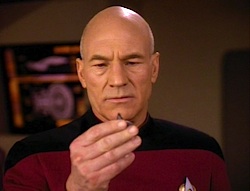“Journey’s End”
Written by Ronald D. Moore
Directed by Corey Allen
Season 7, Episode 20
Production episode 40276-272
Original air date: March 28, 1994
Stardate: 47751.2
Captain’s Log: The Enterprise arrives at Starbase 310 for a meeting with Admiral Nechayev. Wes is also on a break from the Academy and is visiting, though despite the friendly face he puts on for Crusher, La Forge, and Data, he looks distressed.
Nechayev explains to Picard the new treaty terms between the Federation and Cardassia that has redrawn the border between the two powers. There’s a Demilitarized Zone between the two nations and the new borders put several Federation colonies in Cardassian space and vice versa. Nechayev’s response to Picard mentioning this is to say, “This agreement is far from perfect,” which is the understatement of the decade. She follows it by misquoting Otto von Bismarck, saying, “diplomacy is the art of the possible.” (The original quote’s first word was “politics,” not “diplomacy.”)
The colonies have to be evacuated, and the Enterprise has been assigned to evacuate Dorvan V, a colony of North American Indians. Picard pointing out the historical parallel with what Indians went through centuries earlier when Europeans started showing up fall on deaf ears. Nechayev made the same arguments to the Federation Council that Picard is making now. His orders are to remove them—by force if necessary.
Picard and Troi meet with the tribal council to discuss places to relocate. They are, understandably, unhappy. They searched the galaxy for two centuries before they finally found Dorvan V two decades ago. They do not wish to start another such journey.
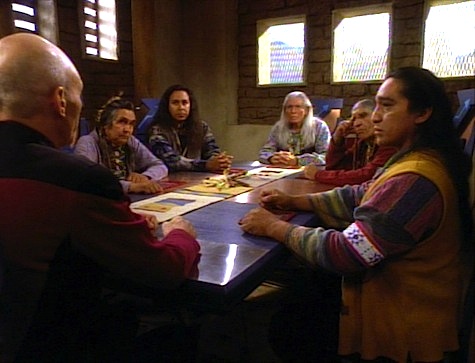
Wes comes into engineering in civilian clothes and proceeds to snottily rip apart one of La Forge’s engine modifications. When Crusher takes him to task on the subject, Wes snaps at her, too.
The Enterprise plays host to a reception in Ten-Forward for the Dorvan colonists. Picard and Anthwara, the head of the council, discuss each other’s ancestors—and Anthwara makes it clear, despite Picard’s urging that it’s for the greater good, that he and his people aren’t planning to go anywhere. Meanwhile, Wes shows up and, after a quick apology to his mother, meets Lakanta, who claims that he saw Wes in a vision quest two years earlier, and that Wes came to Dorvan to find the answers he seeks.
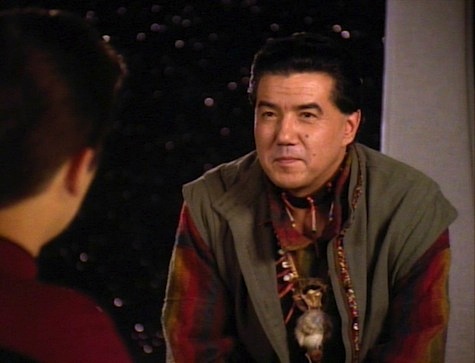
Crusher goes to Picard, concerned about her son—in addition to his obvious attitude problems, his grades are suffering as well. But Picard insists that he has to work this out.
Wes beams down to Dorvan. Lakanta explains that they hold everything sacred—including Wes. And if he is something sacred, then he should treat himself with more respect. Lakanta then takes Wes to the Habak so he can go on a vision quest.
Picard makes it clear to the council that he cannot take no for an answer. Anthwara does not believe that Picard will do so. An ancestor of Picard’s was involved in the Pueblo Revolt and its brutal aftermath in the 17th century. Anthwara believes that Picard specifically was sent to Dorvan V to erase the blood stain of his ancestor.
The Cardassians have arrived six weeks earlier than anticipated. Gul Evek insists to Picard that they’re a preliminary survey team—but he also doesn’t understand why the evacuation hasn’t commenced.
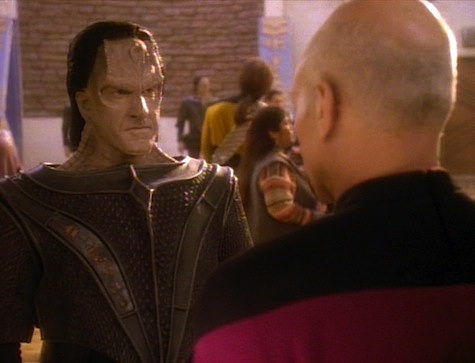
After an appeal to Nechayev fails—the Federation Council stands by its decision, Dorvan’s inhabitants be damned—Picard reluctantly orders Worf to prepare to remove the colonists by force.
In the Habak, Wes sees a vision of his father, who insists that he’s at the end of a journey he began when Jack Crusher died. He needs to go on his own journey now, not the one he thought he had to go on after his father’s death.
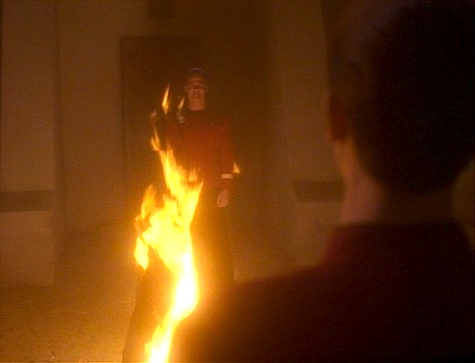
When he leaves the Habak, he sees Worf making preparations to beam out the colonists, and he then reveals that plan to the people of Dorvan. Picard is furious and chews Wes out. Wes insists it’s wrong, and Picard knows that damn well, but he also has his orders, as does Wes.
Except Wes doesn’t anymore, as he removes his combadge and resigns.
Wes explains to Crusher that he’s been a mess for a while, not feeling right at the Academy. The vision just brought it all into focus. He hadn’t said anything to Crusher or anyone because he was worried about disappointing them—and himself.
He beams down to Dorvan, and discovers that the colonists have taken Evek’s people prisoner. Evek wants to beam down troops to take the prisoners back by force (even though he can easily beam the prisoners off the planet), but Picard makes it clear that Worf and his security detail on the planet will defend any attack on Federation citizens.
On the surface, things get out of hand when the prisoners try to escape on their own—
—and then everything and everyone freezes, except for a distraught Wes, and Lakanta, who explains that Wes has pulled himself out of their time. And then Lakanta transforms into his true form, that of the Traveler. Wes is on the first step of a new journey that will take him far beyond any human experience.
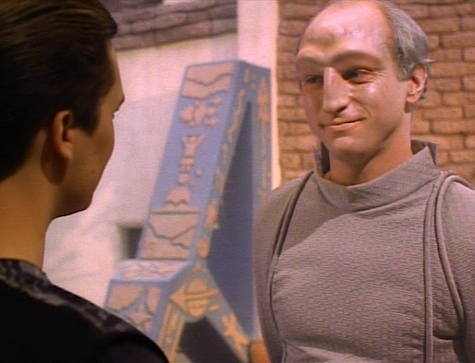
Meanwhile, in real time, the firefight continues. Evek reluctantly agrees to simply beam his people off the planet instead of taking direct action against the colonists—Evek explains to Picard that he lost two of his three sons in the war against the Federation. He does not wish to lose the third.
Picard, Evek, and Anthwara come to an agreement whereby the colonists remain on Dorvan—but under Cardassian jurisdiction. They are, in essence, renouncing their Federation citizenship. Evek says that the Cardassians who come to the world will leave them alone as long as they do likewise, to which Anthwara agrees.
Wes beams down to Dorvan, as he will begin his studies as a Traveler there. (“Just what I need, more studying.”) He has a solemn goodbye scene in the transporter room with Picard and Crusher.
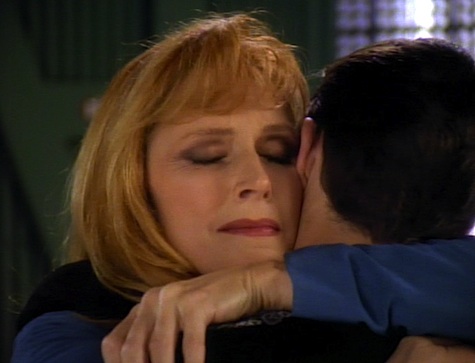
Thank You, Counselor Obvious: Troi’s interest in the “ancient west,” established in “A Fistful of Datas,” apparently extended to the history of the region as well as the stories told, as she’s familiar with the Pueblo Revolt.
If I Only Had a Brain…: When Data and La Forge greet Wes in his quarters upon arrival, they joke about a cadet running loose on board and that they should call security. Data being Data, he feels the need to explain to Wes that it was a joke.
There is No Honor in Being Pummeled: Worf has the unenviable task of getting the colonists off Dorvan, a task made more complicated by Wes being a douche.
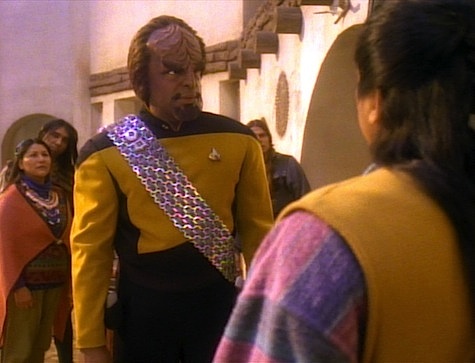
The Boy!?: Wes has the worst case of senioritis ever, and he’s not even a senior yet. He finally comes to the realization that a career in Starfleet is what everyone expected of him, but isn’t necessarily what’s right for him. (Given the greatness that the Traveler saw in him way back in “Where No One Has Gone Before,” becoming just another button pusher on a starship seems a bit of a comedown, anyhow…)
I Believe I Said That: “Now be sure to dress warmly on those other planes of existence.”
Crusher’s final words to her son before he goes off to become a higher being.
Welcome Aboard: Lots of returning guests here: Wil Wheaton, obviously, is back for Wes’s swan song. Natalia Nogulich returns as Admiral Nechayev, having last been seen taking Picard to task in “Descent”; she’ll next be seen in “The Maquis, Part II” on Deep Space Nine. Eric Menyuk returns as the Traveler, last seen in “Remember Me.” And for the third time, following “Family” and “Violations,” Doug Wert appears as an image of Jack Crusher.
Ned Romero returns to Trek as Anthwara—he played Krell, the Klingon in “A Private Little War” on the original series, and will return as the image of Chakotay’s grandfather in Voyager’s “The Fight.” George Aguilar and Tom Jackson play, respectively, Wakasa and Lakanta.
Finally, Richard Poe appears as Gul Evek, who was introduced in DS9’s “Playing God,” and will continue to appear on both TNG and DS9 , and also is the Cardassian chasing Chakotay at the beginning of Voyager ’s pilot episode. This makes the character of Evek one of only four characters to appear on all three 24th-century Trek shows (the others being Q, Quark, and Morn).
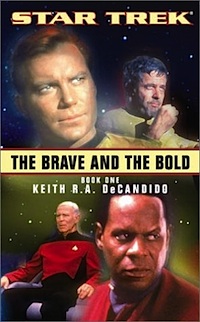
Trivial Matters: Aside from a very brief cameo in Star Trek Nemesis , this is Wil Wheaton’s final Trek appearance as Wes. The character continues to appear in several works of tie-in fiction as a Traveler, including the short stories “Gods, Fate, and Fractals” by William Leisner, “Research” by J.R. Rasmussen (both in Strange New Worlds II) and “Adventures in Jazz and Time” by Kelly Cairo (Strange New Worlds VII); and the novels Enemy of My Enemy by Christie Golden, A Time to be Born and A Time to Die by John Vornholt, your humble rewatcher’s A Time for War, a Time for Peace (which reconciles his being a Traveler with his appearance in Nemesis), and David Mack’s Cold Equations trilogy.
This episode starts an ongoing thread in both TNG and DS9 involving the Demilitarized Zone between Cardassian and Federation space, leading to the formation of a rebel group, which will be formed in the DS9 two-parter “The Maquis.” TNG will next tackle this thread in “Preemptive Strike.” The storyline was intended to help set up Voyager, though it also became an ongoing concern on DS9.
Evek will appear in several works of tie-in fiction as well, including Susan Wright’s The Badlands, your humble rewatcher’s The Brave and the Bold, and Andrew J. Robinson’s A Stitch in Time . (I also portrayed his Mirror Universe counterpart in The Mirror-Scaled Serpent in Obsidian Alliances.)
Although it was never stated onscreen, the intention was always for Dorvan V to be the planet that the Voyager character Chakotay came from. The post-finale Voyager novels by Christie Golden and Kirsten Beyer have made that explicit.
Wes cites Dr. Vassbinder, who was previously mentioned by Picard in “Timescape” as giving an incredibly boring lecture.
Corey Allen also directed Wes’s first appearance in “Encounter at Farpoint,” his final appearance as a regular in “Final Mission,” and the character’s first return to the ship after departing the regular cast in “The Game.”
Crusher mistakenly refers to the Traveler as coming from Tau Ceti rather than Tau Alpha C. She also tells Wes what the Traveler told Picard about Wes in “Where No One Has Gone Before.” Of course, the Traveler specifically told Picard not to tell anyone about Wes’s special nature, “especially the mother.” It’s possible that Picard ignored the Traveler’s advice and told Crusher—it’s also possible that Crusher found out about it when she and Picard were mentally linked in “Attached.”
Make it So: “Maybe I’m sick of living up to everyone else’s expectations!” And so we continue the round of “hey, let’s get one last look in on our recurring characters before we go off the air” episodes. Last time it was Barclay, now it’s Wes. We’ll get Alexander next, and Ro a bit after that. Cha cha cha.
Ron Moore said in an AOL chat in 1997 that he was the one pushing for Wes to leave Starfleet, and I think it was absolutely the right choice. While there are no explicit references to the events of “The First Duty” in this episode, it’s obvious that it was a bucket of ice water in the face for the character. His journey in this episode makes perfect sense. After all, his Starfleet career was kind of shoved in his face. He had a fascination for the workings of the ship, but that doesn’t necessarily translate into becoming an officer, just in getting involved with the sciences. It was Picard who made him an acting ensign in response to the Traveler telling him Wes was akin to Mozart, which can be seen as putting the pigeon in entirely the wrong hole.
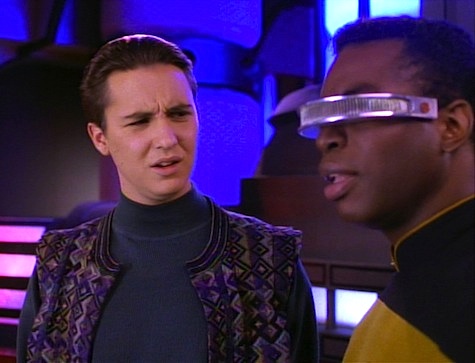
Unfortunately, that part of the story feels creaky, partly because Wil Wheaton brings no nuance to the role. He’s either out of sorts or totally obnoxious. Wheaton is much better now at doing this sort of thing—all of his recent roles have been snotty bastards—but he was obviously new to playing a jackass in 1994 and didn’t quite get it right. It doesn’t help that Tom Jackson is awful as Lakanta, playing the stereotypical “wise Indian” character with all the gravitas of a badly translated fortune cookie.
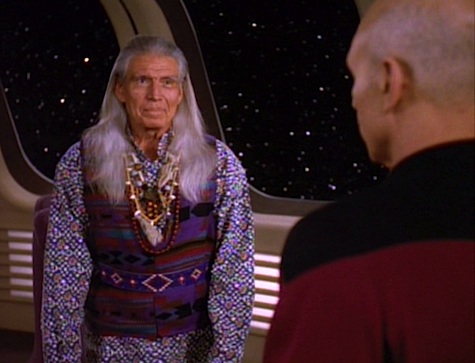
The rest of the episode is far more compelling. I liked the interplay between Picard and Nechayev, with Picard making an effort to make Nechayev welcome and comfortable on the Enterprise, and with Nechayev remaining a hardass, but a compassionate one, one who has already made (and lost) all the arguments Picard is making. She also thanks Picard for making the effort to make her welcome on his ship. The scenes between Picard and Anthwara are also excellent, as Ned Romero does right what Jackson does wrong, giving a nicely understated performance. And Richard Poe does a much better job of snotty than Wheaton as Evek, with the added bonus of being convincing in his pained explanation to Picard of why he won’t fire on the colony.
And in the end, the solution is not a perfect one. In fact, it’s a crappy one, but it’s also the only one that will work in the situation. This episode marks the beginning of a period in Trek history where the chinks in paradise will get shown (which we’ll mostly see on Deep Space Nine). The treaty between the Cardassians and Federation is a classic compromise in that it makes no one happy, and like far too many decisions made by those in the halls of power, have unintended consequences for the ordinary person. Both DS9 and Voyager will run with these (the former in actual story sense, the latter really only for its setup), but this is the episode that really set it in motion. It’s only Trek’s second shot at an ongoing story thread, and the only one that encompassed three separate TV shows.
In any case, this was a fitting end to the character of Wesley Crusher: an interesting notion only partially successfully executed.
Warp factor rating: 6
Keith R.A. DeCandido will be at Lunacon 56 this weekend in Rye Brook, New York. Here’s his schedule.










